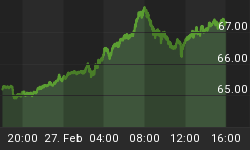The U.S. Dollar finished the month of May sharply lower as investors bought higher-yielding currencies betting on a speedy global economic recovery.
On Friday the U.S. Dollar was driven lower by a report which showed the U.S. economy contracted less than expected in the first quarter, but the bearish catalyst for the week was concern about the ballooning U.S. budget deficit.
Investors are no longer viewing the U.S. Dollar as a safe haven investment and may actually be dumping the Dollar because of concerns over the U.S. government's ability to finance its own debt.
Talk is still lingering in the investment community that Moody's or the S&P Corp. will lower the debt rating of the U.S. This is a major concern especially if foreign countries begin to reduce their exposure to U.S. government debt. Interest rates would soar if the U.S. could not find anyone to take on its debt.
The Fed's failure to hold mortgage rates under 5% while the Treasury supplied the market with new debt is probably the biggest reason for the rise in Treasury yields this week. What this proves is the Fed is good at controlling 30-day yields, but cannot do it for 30-year yields. If the debasement of the U.S. Dollar continues then the Fed may be forced to print more money to finance its debt. This action would weaken the U.S. Dollar further and trigger a huge inflationary spike.
Technically, just about all of the major currencies have retraced 50% of their ranges during the past year. This is in effect a leveling of the playing field. Prices are neither too high, nor too low. So although it looks as if the U.S. Dollar has weakened since the recent low in March, the U.S. Dollar is actually in a better position then it was in a year ago.
The key to understanding the future direction of the U.S. Dollar will be how the currency markets react to bad U.S. economic news. For much of the past year, the U.S. Dollar was treated as a safe haven following poor U.S. economic reports. If foreign investors truly believe that the U.S. is an unsafe place to park their money then the U.S. Dollar should see heavy selling pressure following the next bearish U.S. economic report. This will be the real test as to how the world really feels about the U.S. government's ability to dig out of the current financial mess.















